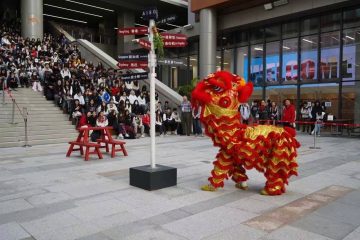
Students at AISG reap the benefits of learning and living in a culturally enriched environment. AISG’s student body comprises countries worldwide, bringing and leaving behind bits of culture with every transition in and out of the school.
What does it mean to be a Third Culture Kid? Dr. Ruth Hill Useem from Interaction Internation defines Third-culture kids as people who have spent a significant part of his/her developmental years outside their parents’ culture. AISG is filled with international students who bring a variety of cultural backgrounds to the table. But with diversity comes challenges that are often overlooked.
Grade 10 Samuel shares, “I grew up mostly in America but came from Colombian roots and surrounded by Colombian foods and cultures but also grown up around Puerto Rican and Colombian music like reggaeton and dembow.”
Although Samuel grew up in a Hispanic household, he calls America home and experienced life in America alongside American communities before changing schools. A struggle many TCK’s face is being ripped away from friends and family. “It impacts me negatively by taking me away from my old friends and old place I used to call home and family.” Grade 10 Samuel said when asked about challenges associated with moving.
Grade 9 Maria is Polish, but lived half her life in China. She pointedly remarks that there isn’t one country she would refer to as home, a common situation international students find themselves in. She said that “changing schools is different every time because the people are different everywhere regardless of culture.” She highlights needing to, at times, take days off school to celebrate Easter, a celebration of her religion, and a period where time is taken to focus on religious identity.
Grade 9 Maria defines cultural identity as “The cultures you’ve absorbed over time from you as a person. International schools influence this mostly through not being international but the people who are part of it. For example, AISG has mainly Chinese and Korean people, which causes more influence from these perspectives and not specifically from the American aspect of the school itself.”
Grade 9 Schuyler shared how traveling across the world has imposed mental stress that she learned to overcome. “Going from an American public school to a mostly Chinese international school across the world wasn’t an easy change, but it was one I could adjust to and adapt to with relative ease. It hasn’t necessarily been easy on my mental health to go from my home country to a new one without too much of a warning, but as I said I’ve been able to adapt pretty easily.”
Being in a culturally diverse community has many benefits. Grade 9 Samarth said “I feel like being around such a diverse group of students has allowed me to become more knowledgeable of different cultures and traditions and has allowed me to appreciate them more. Learning about different cultures and traditions can help you get used to being around a variety of cultures at once.”
An example of exposure to cultures includes Samarth’s wishing teachers Happy Diwali. She said, “There are many cultural holidays that I celebrate. The most prominent would be Diwali, the Indian New Year. I incorporate into my school life wishing my friends and teachers a Happy Diwali and explaining what the holiday is to people who are interested.” By teaching students and teachers across the board about significant cultural events, AISG strives to foster an open and inclusive learning space.
Grade 11 Hana explains that AISG has been supportive of her transition to this school, but believes that going to an international school has taken away from the cultures that she has been taught by her parents while adding new cultures from her friends.
“Honestly, I think it has impacted me negatively in the sense that I feel more comfortable and at home in Japan, but changing schools has taught me different cultures and things that I am happy to have learned.” Said Grade 11 Hana when asked if moving abroad has impacted her positively or negatively.
Living abroad can also foster the beginning of new traditions, one example of this was shared by Schuyler who said: “Me and my family celebrate traditional American holidays such as Thanksgiving, but we also have started hosting a Lunar New Year potluck – we invite some friends and play games and it’s overall a really good time.”
Like many others, Grade 11 Bhavith struggles to pinpoint what country feels like home. He said “Sometimes I wonder what home is, I feel like I have lost the definition of it since I have lived in a few places in China, Hongkong, and India(during COVID), I have made many connections and met new people. I sometimes feel like going to Hong Kong feels like home since I really like the food there, and it is the place where I have traveled a lot and know all the whereabouts, which is why I feel like at home back there.”
Grade 11 Bhavith confides and shares the deep struggles he faced when transitioning to AISG. “I cried before coming to AISG on the way from HongKong to Guangzhou out loud(with no one hearing), and I was still crying inside for the first year since I had no friends everyone saw me as a different person, things that were normal in my old school in Delia like arm wrestling sharing notes that you have written are seen as a strange thing to do, this was one thing that made me feel like I didn’t belong.”
Part of being a Third Culture Kid is the fact that things are always changing. People are always moving to and from schools, exchanging cultures and sharing knowledge. There are both positive and negative aspects to this, and 10th Grade Samuel reminds students to “Always be patient. Patience is really important, and being in a new school with new people can be stressful.”